Dufferin Farm Tour
Dufferin Farm Tour offers a behind-the-scenes peek at agricultural life in the county.
Get out your rubber boots and food coolers. It’s time for the annual Dufferin Farm Tour, which has been showcasing local farm operations for nearly 20 years. This season’s self-guided tour, which includes three farms in the Hockley Valley area and two in Amaranth, takes place Saturday, September 28.
The lineup includes vegetable, beef and dairy producers where “people can see how farms work today and how hard our farmers work to put food on our table,” says tour chairperson Trevor Pugh. The tour also features both a Christmas tree farm and a riding stable and school, which he notes may not “immediately come to mind when you think of farming.”
We checked in on three of the participating farms — Am Braigh Farm, Sevenhills Holsteins and Hockley Valley Farm — for a preview of what tour visitors will experience.
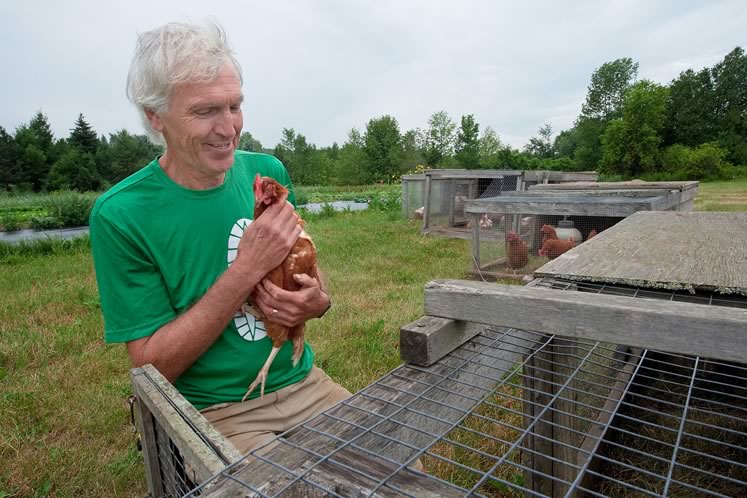
Am Braigh’s owner Jamie Richards with one of his feathered friends. Photo by Rosemary Hasner / Black Dog Creative Arts.
Am Braigh Farm
fifth line ehs | mono
Though Jamie Richards of Am Braigh Farm has been getting his hands dirty in various ways for about 24 years, the retired geography teacher says he has been a serious farmer for only the past decade. His small original market garden has grown to about an acre, and he offers salad greens, carrots, vegetables and other products at a self-serve shop at the end of his laneway.
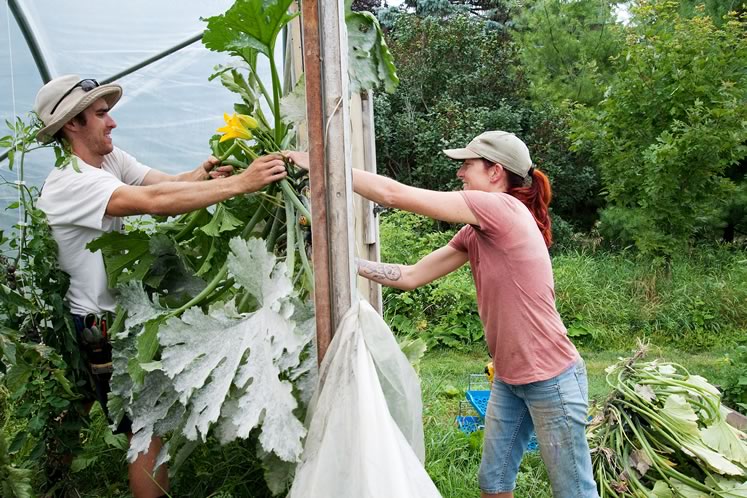
Alex Maycock and Marisa Lawson at work on Mono’s Am Braigh Farm. Photo by Rosemary Hasner / Black Dog Creative Arts.
In addition, a total of 4,500 square feet in four greenhouses enable Jamie to produce food year-round. “We use minimal heat in two of the greenhouses for the more sensitive crops,” he says. “The rest are not heated.”
A member of a local group dedicated to the principles of Project Drawdown, the non-profit research group founded by California environmentalist Paul Hawken, Jamie says he hopes to rally local farmers to adopt regenerative growing techniques aimed at countering climate change. Regenerative practices involve minimizing soil disturbance, promoting diversity through crop rotation, and improving the surrounding natural ecosystem.
“We in agriculture are on the front line of climate change, both in feeling its effects as well as being an important instrument of change,” he says. “Regenerative agriculture is becoming the inevitable next step in agriculture.”
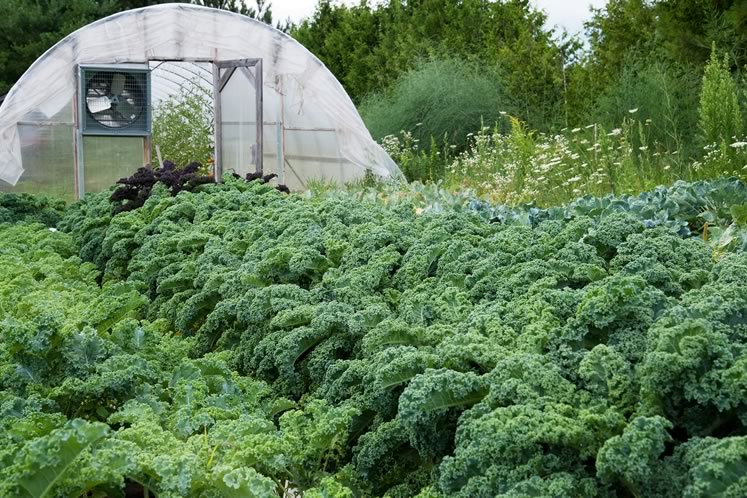
A patch of leafy greens at Mono’s Am Braigh Farm. Photo by Rosemary Hasner / Black Dog Creative Arts.
Am Braigh was on the farm tour about five years ago and Jamie says the experience was pleasantly overwhelming. “We had over 500 people and I had no idea that we would be seeing that many people. It was kind of neat to realize there’s that much interest.”
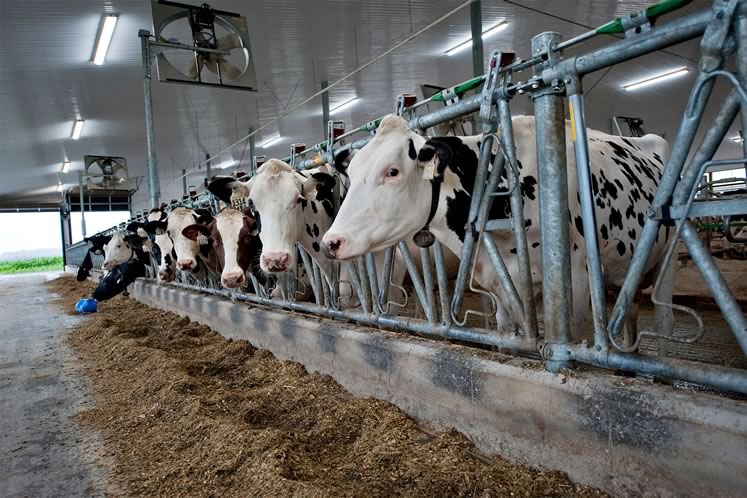
At Sevenhills Holsteins in Amaranth, dairy cows are milked in an automated 35,000-square-foot barn. Photo by Rosemary Hasner / Black Dog Creative Arts.
Sevenhills Holsteins
seventh line | amaranth
The new automated milking facility at Sevenhills Holsteins is the pride and joy of the Overgaauw family. “We are a family-run farm,” says Kevin Overgaauw. “We do everything ourselves.”
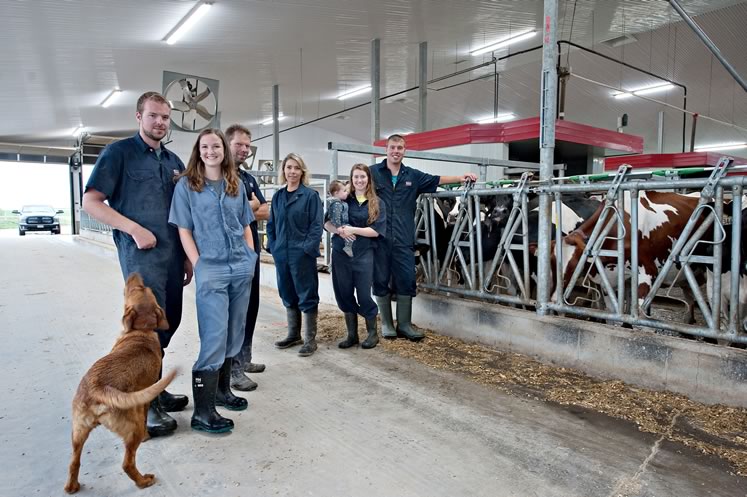
In the barn at Sevenhills are Kevin Overgaauw, his girlfriend Tori Sawyer, Paul and Marion Overgaauw, and Samantha and Dave Overgaauw with baby Dawson. Absent: Mark Overgaauw. Photo by Rosemary Hasner / Black Dog Creative Arts.
By “ourselves,” Kevin means himself and his parents, Paul and Marion, who own the operation, as well as younger brother, Mark, and older brother, Dave. Dave’s wife, Sam, also helps out, and the couple’s 11-month-old baby, Dawson, is never far away.
Automated milking began last December in the 35,000-square-foot purpose-built “robot barn,” located across from the family’s home farm. The robot barn is the part of the operation that will host visitors during this year’s tour.
Kevin and his girlfriend, Tori, run the new barn, which houses about 130 Holsteins, the distinctive black- or red-and-white cattle known for their high milk production. About 100 of the cows are milked regularly, each producing about 35 litres of milk a day, while the remaining 30 are in various stages of “drying off.” The cows are free to roam the barn, deciding for themselves when to socialize, when to feed, and when to rest and chew their cud – as well as when they want to be milked. Each cow sports a collar fitted with a digital device that enables Kevin and Tori to monitor a variety of data, including when the cow was milked.
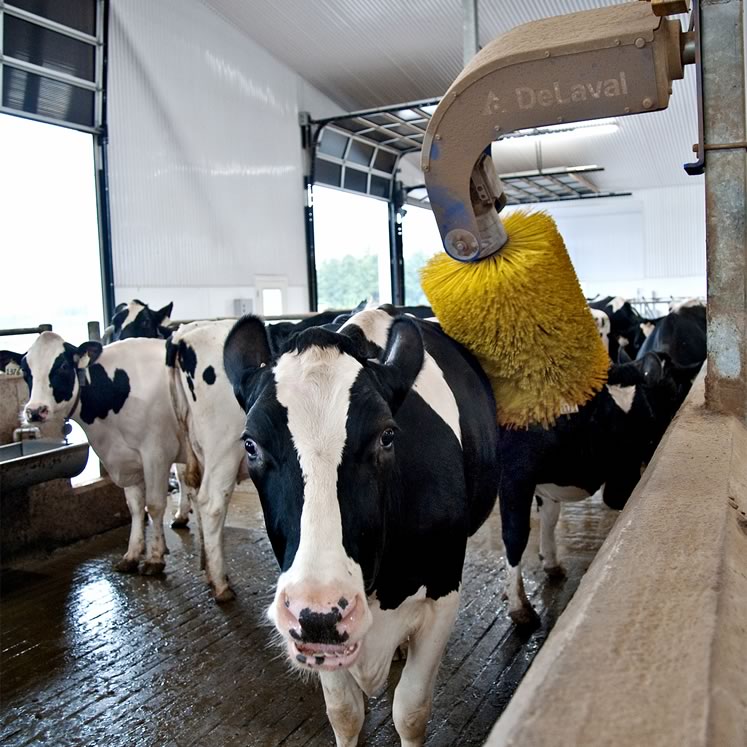
A Holstein dairy cow gets a brush-down at Sevenhills Holsteins. Photo by Rosemary Hasner / Black Dog Creative Arts.
Many of the cows will be busy at work during the tour so visitors will be able to see the operation in action, and may have a chance to pet some of the calves.
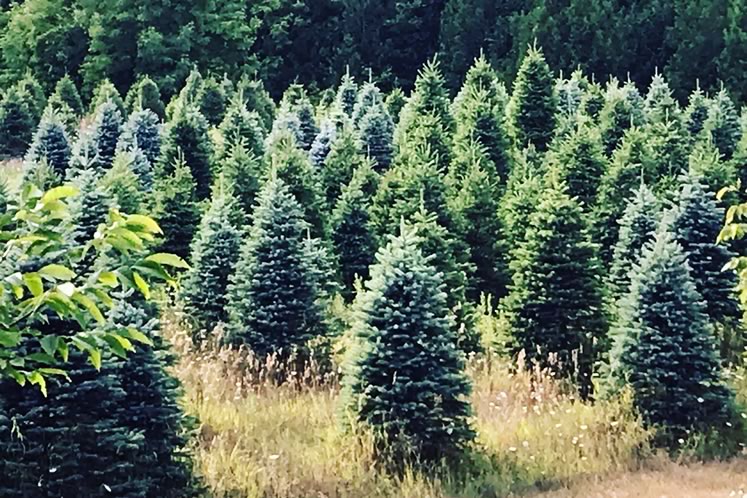
A view of future Christmas trees at Hockley Valley Farm. Courtesy of Hockley Valley Farm.
Hockley Valley Farm
hockley road | mono
Expect an early dose of Christmas as Jason and Vikki Huck of Hockley Valley Farm open the 93-acre Christmas tree farm they bought in 2016.
Tractor-drawn wagons will carry guests through the tree fields, where a guide will describe what it takes to grow Christmas trees – and discuss the environmental benefits of celebrating the holiday with a live tree.
About 12,000 trees are currently in various stages of maturity, with more planted every year. “We plant seedlings in the spring and fall,” says Jason. It takes as long as 12 years for seedlings to reach harvest size. During that time, the Hucks carefully nurture each tree.
“Because we don’t spray herbicide on our farm, vegetation management is important to maintaining tree health,” he says. That management includes cutting grass around the trees throughout the season and pruning the trees in late summer to ensure a full and uniform shape.
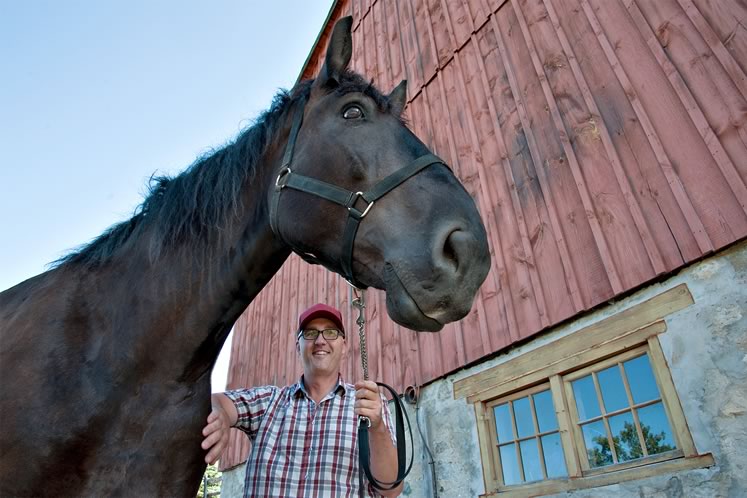
Jason Huck of Hockley Valley Farm with one of his Percheron horses. Photo by Rosemary Hasner / Black Dog Creative Arts.
The family is also excited about the opportunity to show off their Percherons. During the winter, the heavy horses are used for sleigh rides, complete with jingle bells, but they have also become popular year-round as part of the setting for wedding and family photos. During the farm tour, Percherons Ike and Duke will be hitched up for wagon rides through the maple bush.
To round out the tour experience, the farm’s 19th-century bank barn will be filled with Christmas-ready handmade crafts and decor items. “We’ll be working hard to create an old-fashioned farm experience that gets people looking forward to the holiday season,” says Jason.
More info
Take the Dufferin Farm Tour
The tour takes place September 28 from 9 a.m. to 4 p.m.
- Along with Am Braigh Farm, Sevenhills Holsteins and Hockley Valley Farm, the tour includes Eric Pott and Family Farm and Hockley Hills School of Horsemanship.
- Admission to the tour is a non-perishable food or cash donation for the Orangeville Food Bank. Food bank donations can be dropped off on tour day at any host farm.
- Register for the tour at dufferinfarmtour.com, where you can also sign on to the tour mailing list to stay up to date on the latest tour news.
- The tour is self-guided and includes animals, farm-related activities and displays, as well as local produce and goods available for purchase. Bring cash and a cooler for purchases.
- Dress appropriately – the tour takes place rain or shine.
- There is lots to see and do, so allow enough time if you want to visit every farm.
Dufferin farming by the numbers
Farm production generates an estimated $259 million in overall annual economic activity in Dufferin County, making it the largest economic contributor in the county.
729 ~ Number of farms in Dufferin County
26 ~ Number of Dufferin farms that generate more than $1 million in annual revenue
279 ~ Number of Dufferin farms that generate more than $50,000 in annual revenue
48 ~ Percentage of Dufferin land dedicated to farming
18,000 ~ Number of Dufferin hectares devoted to growing hay, the county’s largest crop by area
17 ~ Percentage of Ontario potatoes grown in Dufferin County
33,000 ~ Number of cattle in Dufferin County
62,000 ~ Number of people in Dufferin County
Sources: Statistics Canada, 2016 Census; Dufferin Federation of Agriculture, January 2017
Related Stories
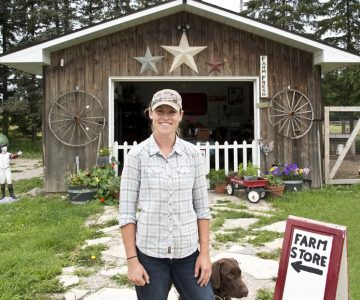
Rockcliffe Farm’s Free-Range Thinking
Jun 20, 2019 | | FarmingAlix and George Bezak raise black Angus cattle, chickens and more at their Mono property, winning over natural-meat converts one farm tour at a time.

Life at a Flower Farm
Mar 19, 2019 | | FarmingMeet the women behind the blooms at Petals Flower Co., Purple Hill Lavender Farm, Stonewell Farm, Broadside Flowers and Caledon Hills Peony Farm.

A Vineyard Grows in Hockley
Mar 21, 2016 | | FarmingHow Mario Adamo’s Italian roots – and love of fine wine – spurred his family’s next big adventure.













What an interesting articles. This was sent to me by a niece Overgaauw, a sister of Paul. The company of the Overgaauw family makes a big impression. What a great development by Paul and Marion. In the Netherlands this had never been succeeded. Corry Westgeest, aunt of the Overgaauw family
corry westgeest from Enschede, nederland on Jan 5, 2020 at 5:50 pm |